German Shepherd
The German Shepherd dog is one of the most universally sought-after breeds, praised for their high intelligence and unflinching loyalty. Originating in Germany, they excel in various roles from service work to therapy. German Shepherds are very obedient, which makes them easy to train, and they have a great time doing it. Their strong, agile build and distinctive markings make them a prized working partner and beloved family companion.
Official name: German Shepherd Dog
Other names: German, Shepherd, Alsatian, GSD
Origins: Germany
Drooling tendencies
1 out of 5Grooming needs
5 out of 5Shedding Level
5 out of 5Barking tendencies
4 out of 5Energy level*
5 out of 5Compatibility with other pets
2 out of 5Warm weather?
3 out of 5Cold weather?
4 out of 5Suited to apartment living
2 out of 5Can stay alone
1 out of 5Family pet?*
4 out of 5
| Male | Female |
|---|---|
| Height | Height |
| 60 - 65 cm | 60 - 65 cm |
| Weight | Weight |
| 30 - 40 kg | 30 - 40 kg |
| Life stages | |
|---|---|
| Puppy | Adult |
| 2 to 15 months | 15 months to 5 years |
| Mature | Senior |
| 5 to 8 years | 8 to 18 years |
| Baby | |
| Birth to 2 months | |
Drooling tendencies
1 out of 5Grooming needs
5 out of 5Shedding Level
5 out of 5Barking tendencies
4 out of 5Energy level*
5 out of 5Compatibility with other pets
2 out of 5Warm weather?
3 out of 5Cold weather?
4 out of 5Suited to apartment living
2 out of 5Can stay alone
1 out of 5Family pet?*
4 out of 5
| Male | Female |
|---|---|
| Height | Height |
| 60 - 65 cm | 60 - 65 cm |
| Weight | Weight |
| 30 - 40 kg | 30 - 40 kg |
| Life stages | |
|---|---|
| Puppy | Adult |
| 2 to 15 months | 15 months to 5 years |
| Mature | Senior |
| 5 to 8 years | 8 to 18 years |
| Baby | |
| Birth to 2 months | |
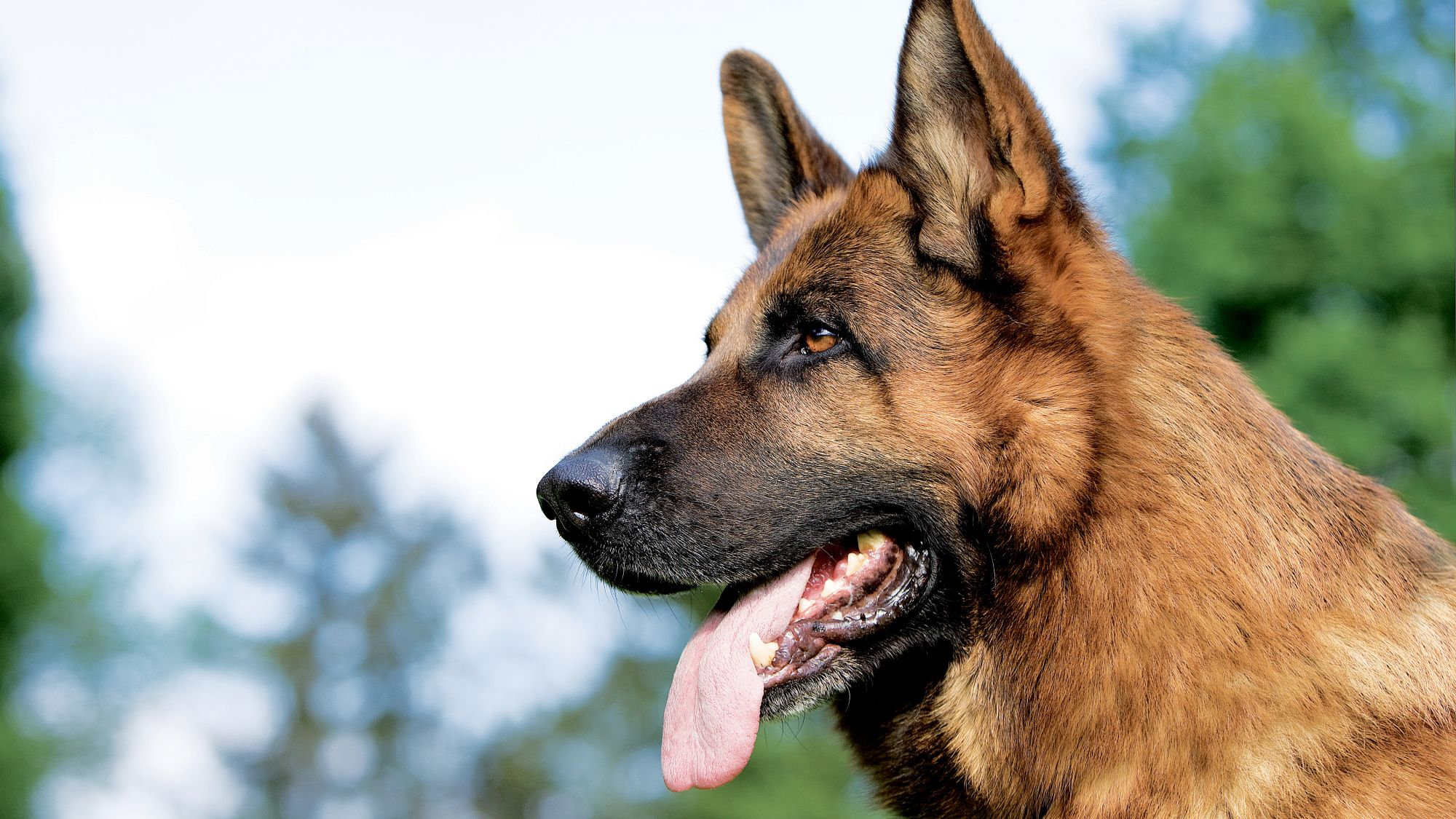
Get to know German Shepherd
The energy level of the German Shepherd? High. But that can also equate to fun, as the breed looks upon any activity as welcome activity. Walking, running, all work for the German Shepherd, as do tracking and agility competitions, which they excel at.
If there’s one characteristic that defines the German Shepherd, it’s their smarts. They are known for having incredibly high intelligence and the ability to figure things out - part of the reason, along with their faithful nature, that they’re often used by armed forces.
Because of their very high intelligence, the German Shepherd dog is also used widely as a service dog for disabled or visually impaired persons. They’re ideally suited for the role given their unwavering loyalty, smarts, and keen sense of smell.
Train them well and this breed will return your requests in spades. They are incredibly bonded to their owners and families, so teaching your German Shepherd won’t be hard, it just needs to be consistent. Proper socialization from a young age is crucial to ensure they develop into well-rounded dogs that are comfortable and confident in different environments, around various people and other animals.
Last, but not least, is the breed's other hallmark—that coat! It’s a double one, and composed of thick, plush fur dappled with distinctive, rich colorings that give the German Shepherd breed their regal look. Consistent brushing will ensure their fur stays nice and shiny, getting rid of any loose hairs and avoiding matting.
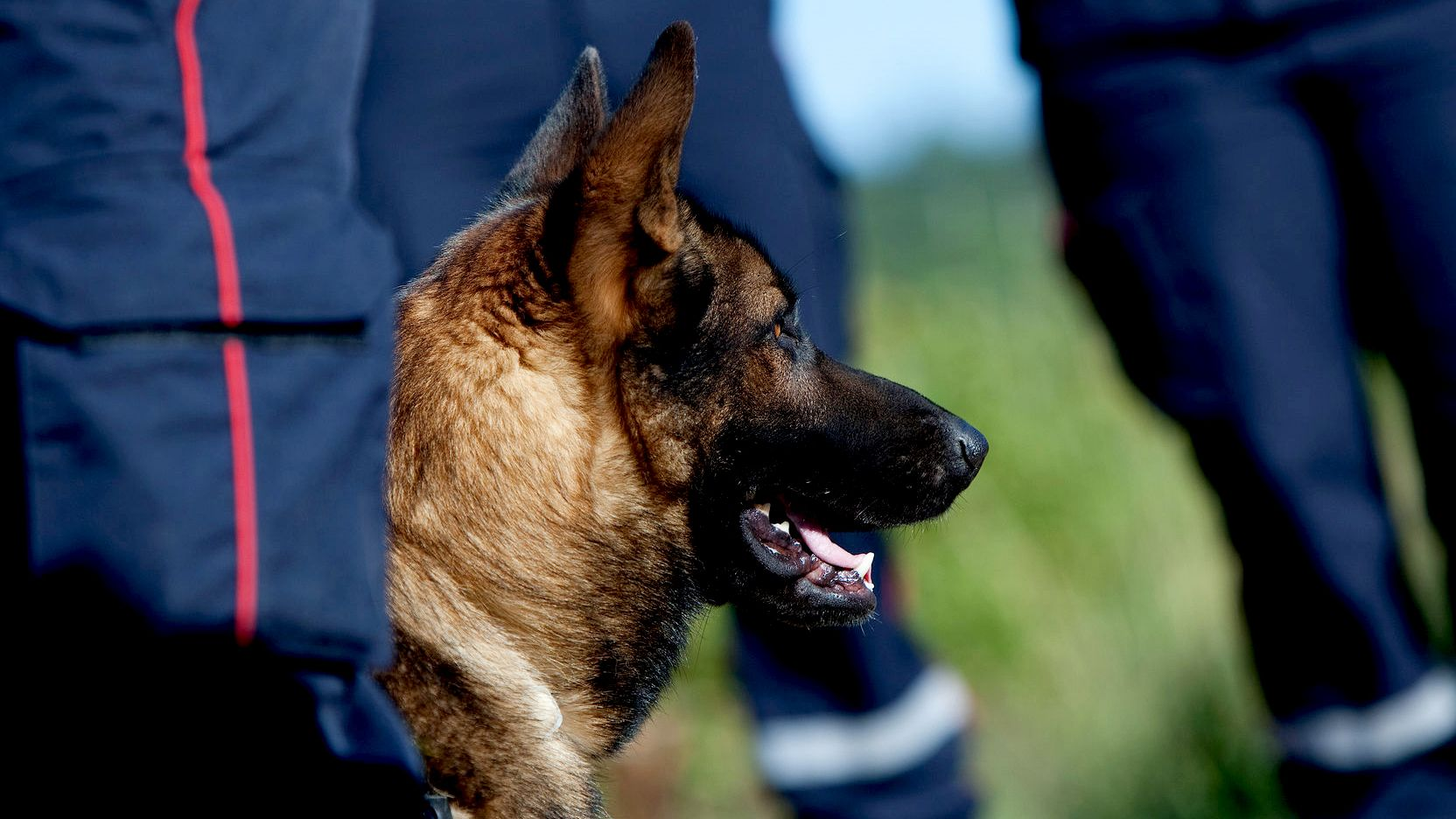
Facts about German Shepherds
1. An incredible sense of smell
The German Shepherd breed is one of the leaders in olfactory abilities, meaning their sense of smell is strong. They are traditionally used to perform search and rescue, and for bomb and drug sniffing in police and military work because of this keen characteristic.
2. Speaking of noses...
Bred as a herding dog, the German Shepherd is known for rounding up not only other animals but even humans. They’ll nudge you with their nose - when they want to go out, go for a walk, or when it’s mealtime.

Enter our Spring Giveaway
History of the breed
Von Stephanitz then founded a club for the breed in Frankfurt in 1899 called the Verein für Deutsche Schäferhunde (Society for the German Shepherd Dog). The breed developed strong obedience in the ensuing years, becoming increasingly used for security, especially by the military and police who still widely employ the German Shepherd today.
And the public has joined their ranks: The German Shepherd gained huge popularity in the early Twentieth Century in the U.S. as a result of dog movie stars Rin-Tin-Tin and Strongheart. The breed is highly popular worldwide - in the top ten of U.S. breeds for the past ten years according to the American Kennel Club.
From head to tail
Physical characteristics of German Shepherds
1.Ears
2.Head
3.Fur
4.Body
5.Tail
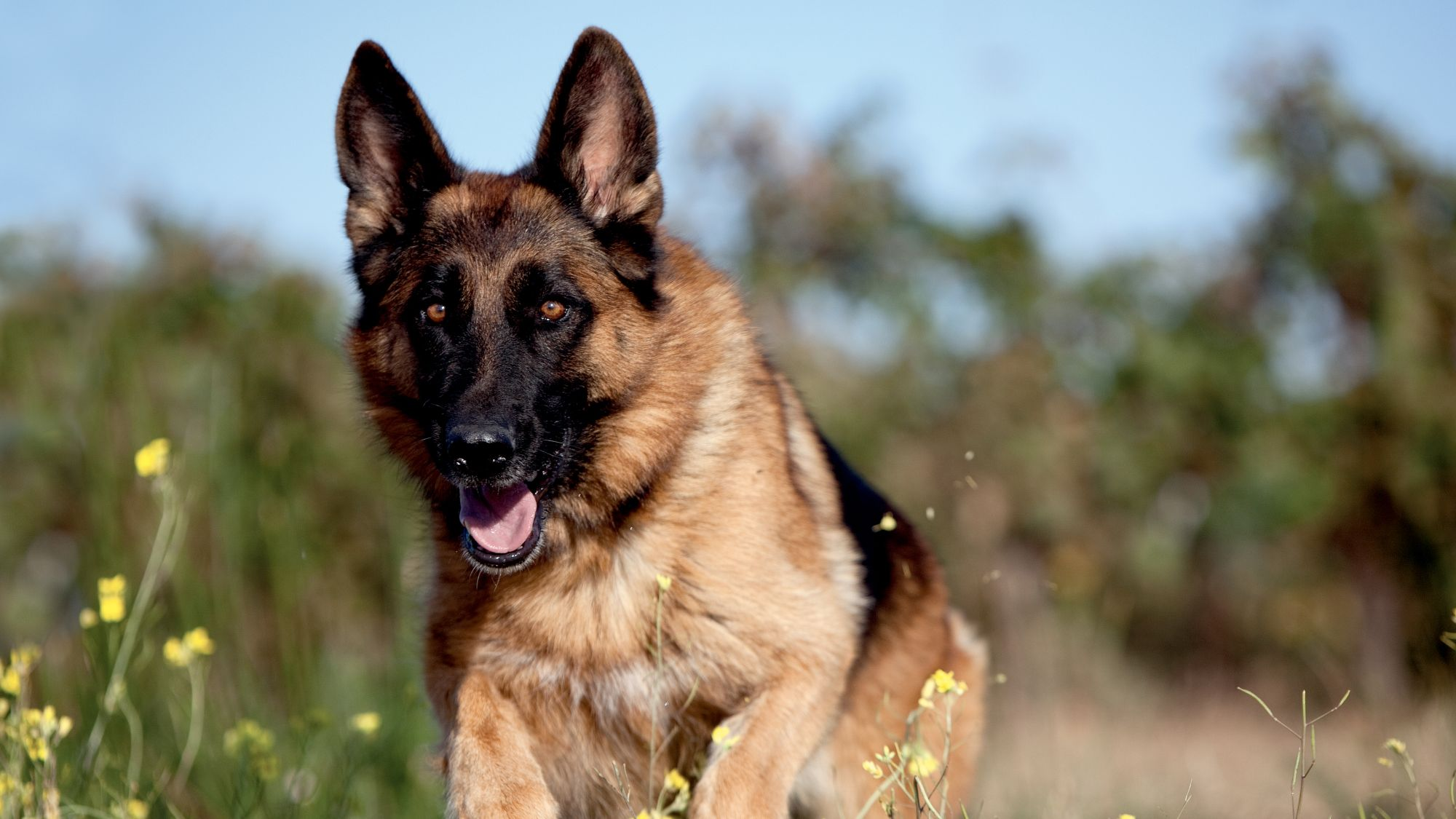
Things to look out for
From specific breed traits to a general health overview, here are some interesting facts about your German Shepherd
A strong breed with a touchy stomach
When it comes to health, German Shepherds can have occasional bouts of digestive tract disorders and diarrhea. While not life-threatening, it is nonetheless no fun for the dog. Your veterinarian will keep an eye on adverse reactions to food, diarrhea or loose stool, gastroenteritis, pancreatic insufficiency, bloat, or IBD, among other disorders. Allergic dermatitis, or skin irritation, can also occur. Feeding your dog highly nutritious food will keep them on track. A proper diagnostic workup is mandatory, which can be time—and money—consuming. A veterinarian will help keep them on track.
It's those hips!
Hip dysplasia is the third top illness for the German Shepherd ¹- in fact, they are predisposed. It is a developmental syndrome of the ball and socket joint where the thigh bone and the hip bone don’t quite conform. The result is arthritis. It’s important that the rate of growth, especially for large-breed dogs, stay constant so their bones and muscles develop together. Dysplasia can happen more often when muscles grow faster, thus putting stress on bones and joints, potentially causing arthritis and then dysplasia. A simple veterinarian check for your German Shepherd can find signs of predisposition or occurrence.
Energy to burn
The German Shepherd dog is an extremely high-energy breed. It’s exciting to think about adding this gracious canine to your home, but they are not the breed for everyone. They thrive on a lot of daily exercise—so much so that the German Shepherd will easily accompany you on long runs, trotting alongside for hours.
Tailored nutrition for German Shepherds
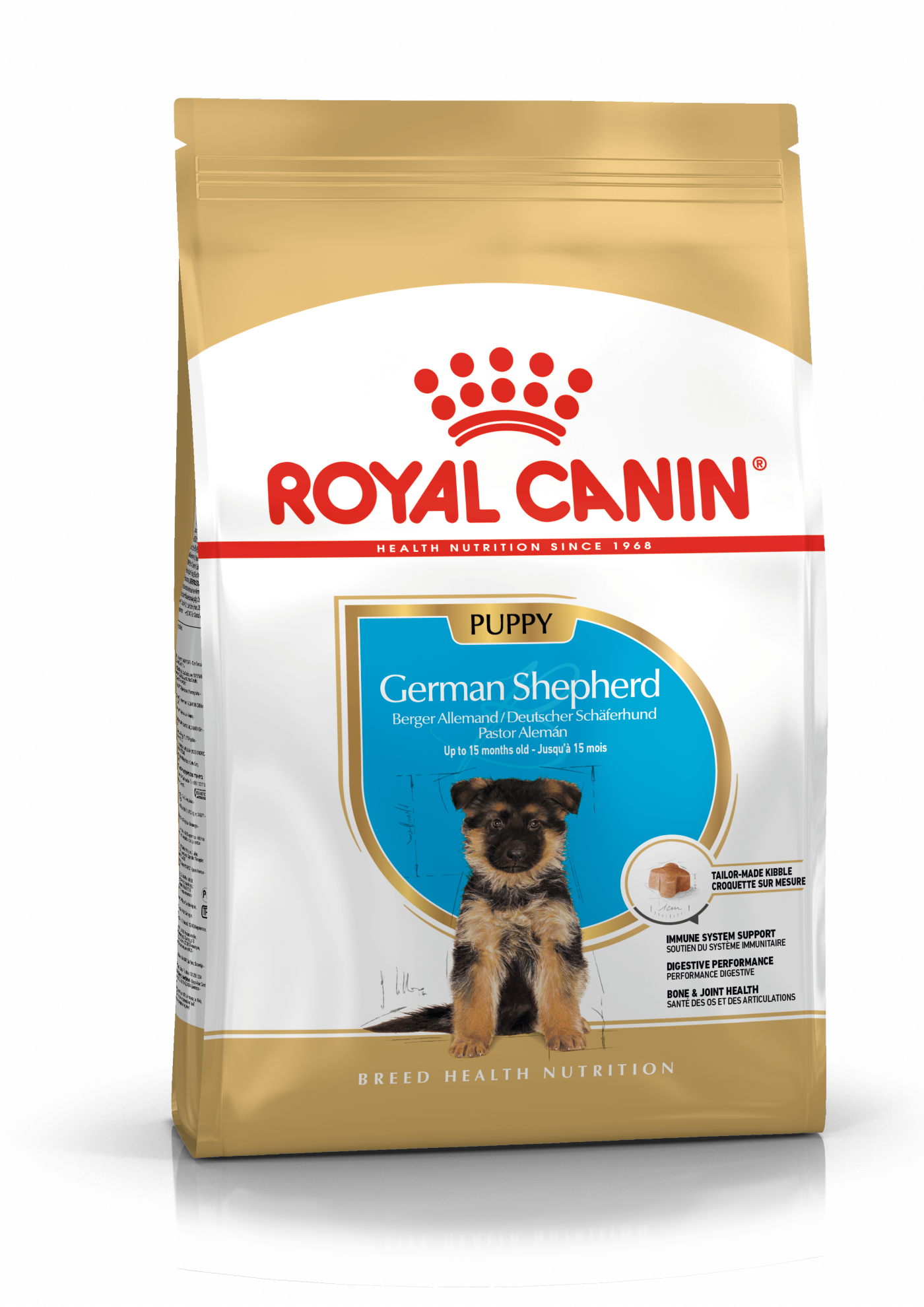
When choosing food for a German Shepherd, there are many factors to consider: their age, lifestyle, activity level, physiological condition, and health including potential sickness or sensitivities. Food provides energy to cover a dog’s vital functions, and a complete nutritional formula should contain an adjusted balance of nutrients to avoid any deficiency or excess in their diet, both of which could have adverse effects on the dog. Clean and fresh water should be available at all times to support good urinary health. In hot weather and especially when out exercising, bring water along for your dog’s frequent water breaks. Energy intake may also have to be adapted to the weather conditions. A dog that lives outdoors in winter will have increased energy requirements. The following recommendations are for healthy animals. If your dog has health problems, please consult your veterinarian who may recommend an exclusive veterinary diet.
Immune System Support
As puppies grow, they will experience big changes and new discoveries. The puppy formula is tailored to German Shepherds, supporting their natural defenses with an exclusive complex of antioxidants including vitamin E.
Digestive Performance
Support the German Shepherd's sensitive digestive system with highly digestible proteins and a selection of specific fibers to limit intestinal fermentation and to help maintain a balanced intestinal flora.
Bone & Joint Health
Balanced energy intake and precise mineral content (calcium and phosphorus) contribute to the development of strong bones and healthy joints in German Shepherd puppies. This exclusive diet also helps maintain ideal weight.
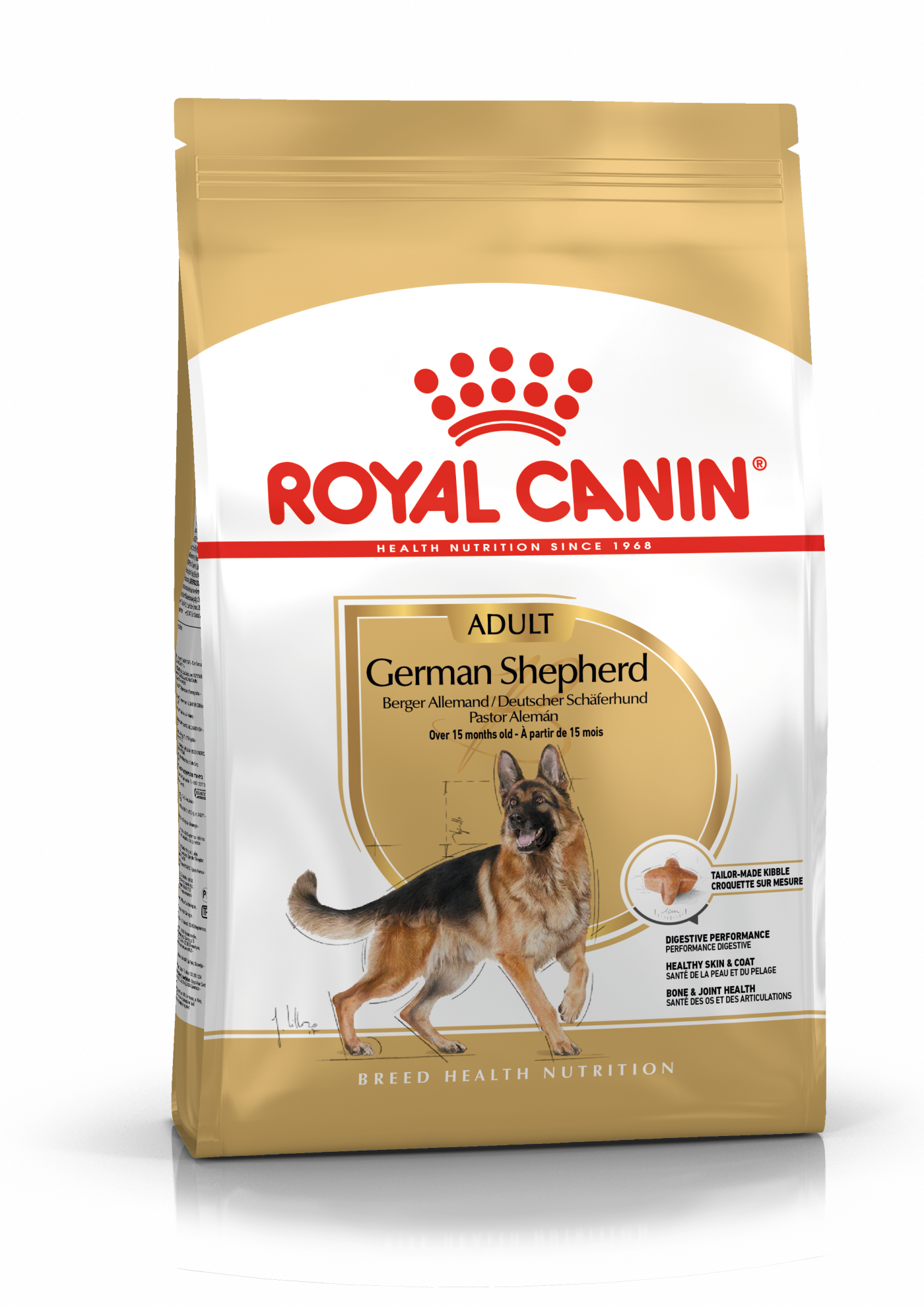
The main nutritional goals for adult German Shepherds are:
Digestive Performance
A longer colonic transit time combined with large breed dogs' higher colonic permeability can lead to more fermentation and poor stool quality. The adult formula supports the German Shepherd's sensitive digestive system with highly digestible proteins and a selection of specific fibers to help maintain a balanced intestinal flora.
Healthy Skin & Coat
The skin and coat reflect the dog's state of health, and appropriate nutrition plays an important part in maintaining their quality. Help support the skin's role as a barrier with an exclusive complex of nutrients and EPA and DHA to help maintain skin and coat health.
Bone & Joint Health
The lively temperament of the German Shepherd leads to hard-working joints. Support healthy bones and joints and help maintain their ideal weight. Enriched with EPA and DHA.
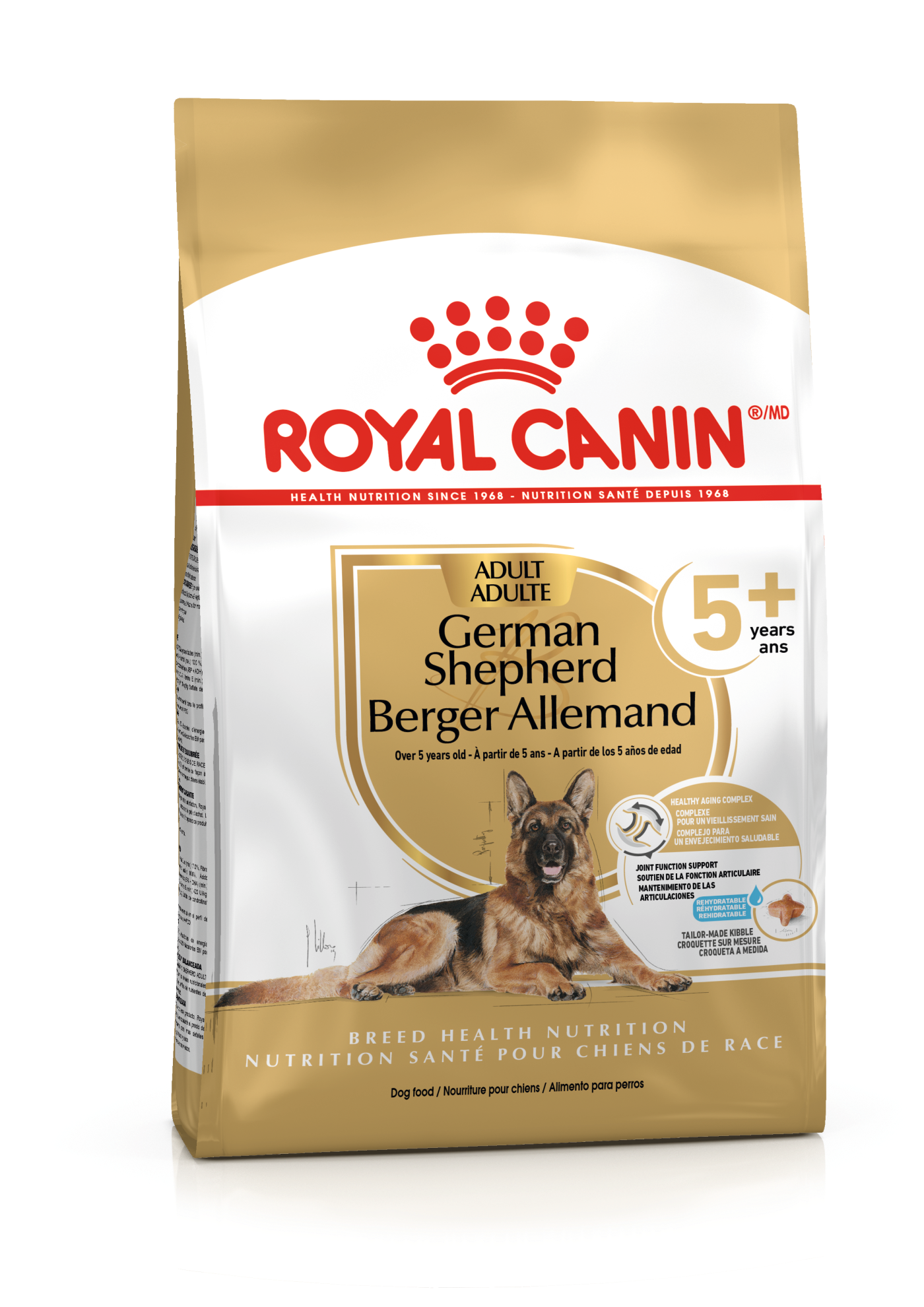
After 5 years old, German Shepherds will start facing the first signs of aging. A formula enriched with antioxidants will help maintain their vitality, and specific nutrients, such as chondroitin, glucosamine, collagen, and EPA-DHA, will help maintain healthy bones and joints. Aging is also accompanied by the modification of digestive capacities and particular nutritional requirements, so food for older German Shepherds should have the following characteristics:
Healthy Aging Complex
The German Shepherd Adult 5+ is developed to support healthy aging, containing an exclusive combination of antioxidants to help maintain cellular health. Formulated with an approriate phosphorus content to help care for the kidney health of German Shepherds as they mature.
Joint Function Support
Formulated to provide advanced nutrients, including collagen, EPA & DHA to help support cartilage during the aging process, helping to maintain healthy bones and joints.
Digestive Health
Support the German Shepherd's sensitive digestive system with highly digestible proteins and a selection of specific fibers, including prebiotics to promote a balanced intestinal flora and help promote optimal stool quality.
Highly Palatable & Rehydratable
The kibble's size, shape and texture are adapted to the mature German Shepherd. The kibble may be softened with warm water to allow for easy eating.
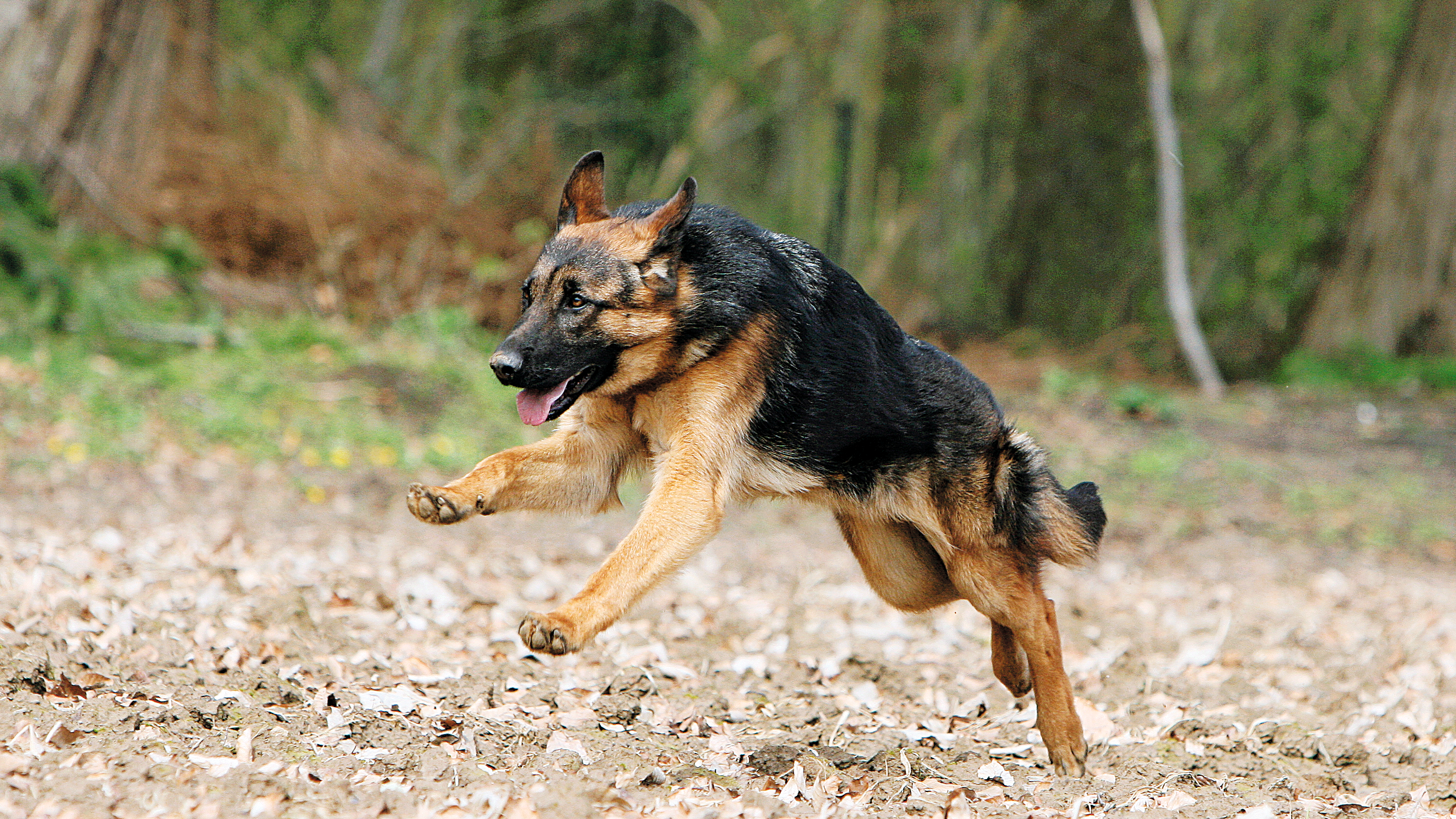
Caring for your German Shepherd
Grooming, training and exercise tips
German Shepherds and exercise go hand-in-hand. They require a large amount of daily activity as a highly athletic and high-functioning dog. Great runner—alone or with humans—they can go long distances. Herding, tracking, or agility exercises are also excellent for the breed who is often a competitor in these kinds of contests, not to mention working dog competitions and dog shows of all kinds.
German Shepherds have a double coat - a slightly thick coarse outer coat with a soft undercoat. Brushing twice a week is best. Despite their high athleticism, German Shepherds don’t need baths too often. Typically, long-haired breeds do shed, but less so if brushed regularly. Shedding will happen twice a year, to make way for the new fur. Nail trims should be done monthly, however, a dog that walks on hard surfaces will rub down his nails and subsequently they won't need clipping as frequently.
A highly trainable breed, German Shepherds have a personality that responds well to direction and commands. They very much want to please, and it’s no exaggeration to say they’re incredibly intelligent, a great combination when it comes to shaping them into a superb companion. It’s recommended to start training very early on, as German Shepherds are always in search of a task. They are highly bonded to their human family members.
German Shepherds and exercise go hand-in-hand. They require a large amount of daily activity as a highly athletic and high-functioning dog. Great runner—alone or with humans—they can go long distances. Herding, tracking, or agility exercises are also excellent for the breed who is often a competitor in these kinds of contests, not to mention working dog competitions and dog shows of all kinds.
German Shepherds have a double coat - a slightly thick coarse outer coat with a soft undercoat. Brushing twice a week is best. Despite their high athleticism, German Shepherds don’t need baths too often. Typically, long-haired breeds do shed, but less so if brushed regularly. Shedding will happen twice a year, to make way for the new fur. Nail trims should be done monthly, however, a dog that walks on hard surfaces will rub down his nails and subsequently they won't need clipping as frequently.
A highly trainable breed, German Shepherds have a personality that responds well to direction and commands. They very much want to please, and it’s no exaggeration to say they’re incredibly intelligent, a great combination when it comes to shaping them into a superb companion. It’s recommended to start training very early on, as German Shepherds are always in search of a task. They are highly bonded to their human family members.
7/7
All about German Shepherds
The breed makes an excellent family pet once trained since they are incredibly loyal and bonded to people. The German Shepherd needs a job to do so responds well to commands. They are willing to go on walks or runs anytime, and tend to be very kid-friendly and protective. Their high intelligence makes them obedient to boot.
Other breeds that might interest you
Read more on this topic
Sources
- ¹ https://vcahospitals.com/know-your-pet/hip-dysplasia-in-dogs#:~:text=A%20study%20of%20German%20shepherds,diets%20for%20large%2Dbreed%20puppies.
Like & share this page